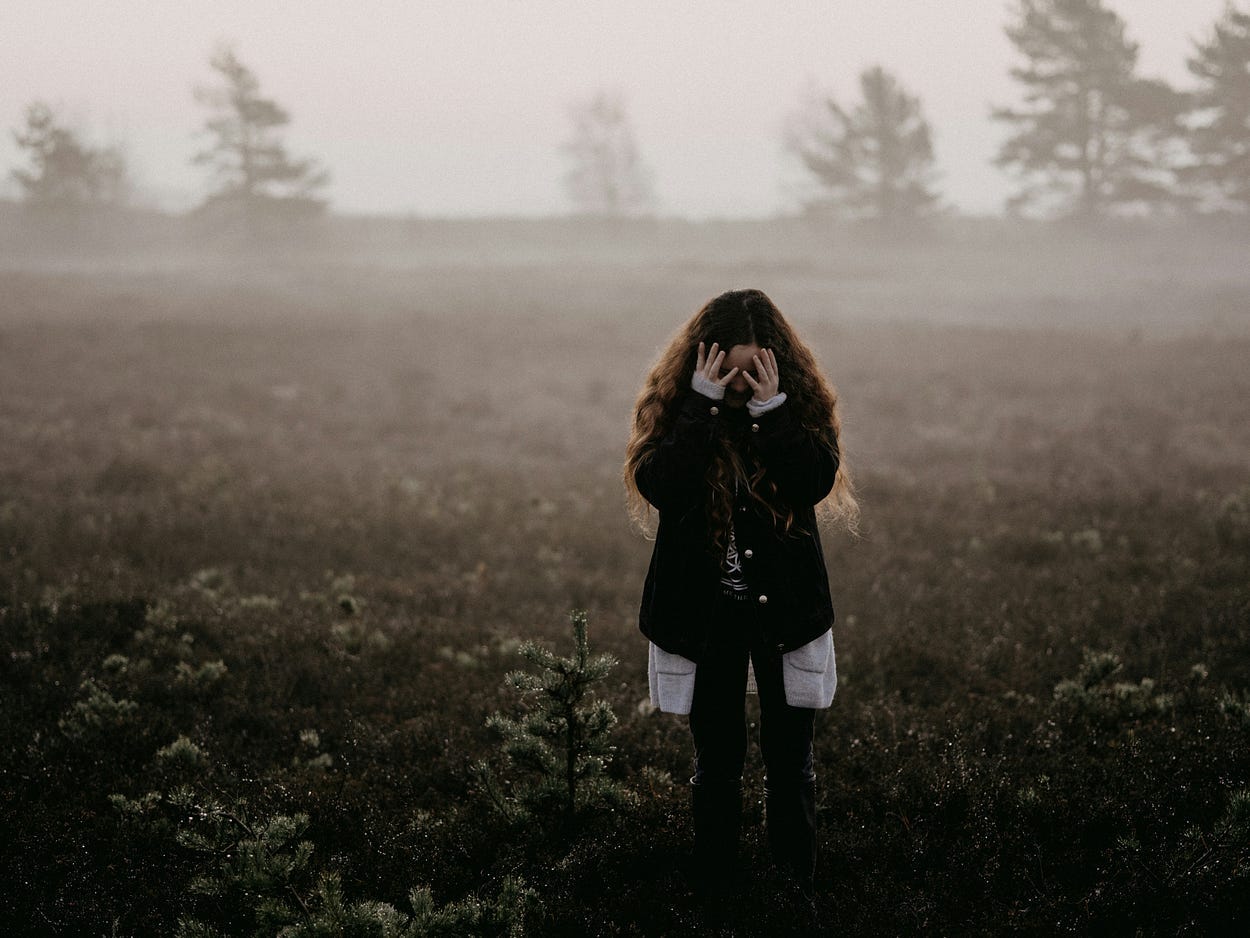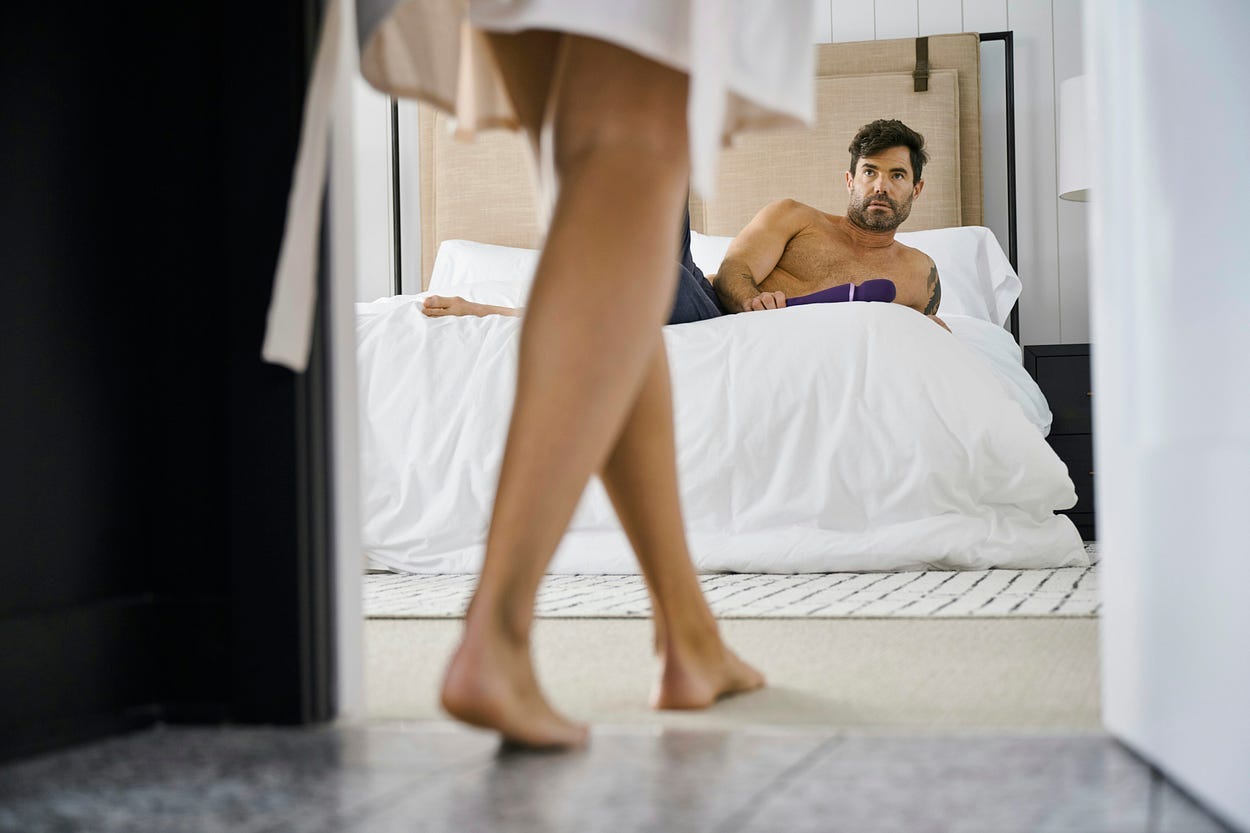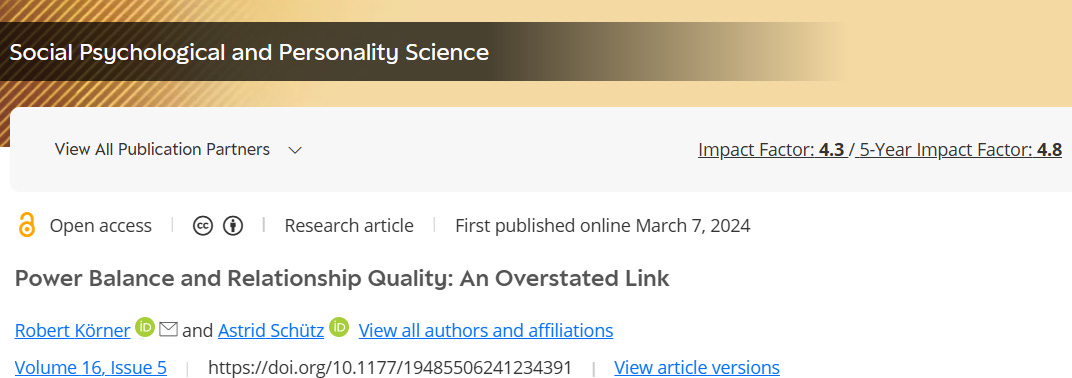Wait a second, is shame just a lack of power?
When you recognize that you don't have status or influence, it affects your self-concept -- and your social behavior.

I have been writing about shame for years now: where it comes from, how it operates physiologically, the various roles that it has played culturally and historically, evolutionary theories about the function it serves, the impact it has on fights to remedy systemic issues, and of course, a whole wide span of thinking about how an individual might overcome it.
I thought I had a pretty good handle on the subject. But this week I read a newly-published research study that, for whatever reason, made a straightforward realization click into place for me: shame is just a feeling of lacking power.
The study comes from the journal Social Psychology and Personality Science, and it’s an examination of how romantic partners’ feelings of power influence their romantic relationship quality and sexual satisfaction.
I think it’s high time for another Research Roundup!
Study authors Robert Körner and Astrid Schütz examined the relationship between perceived power, relationship satisfaction, and sexual satisfaction in a series of four studies conducted on 879 straight couples (with a pretty impressive range of ages and relationship durations — we are not just looking at college freshmen who were required to participate for class credit, here).
The authors were interested in examining whether the amount of power that a person holds in their relationship has a strong influence on a variety of positive feelings they might have toward their partner and the relationship: how fascinated and admiring they are of their partner, how invested they are in the relationship, how much long-term potential they see the relationship having, how much they trust their partner, and how constrained they feel in the relationship.
Körner & Schütz also questioned participants about how much they enjoyed spending time with their partner, how intimate they felt with them, and how frequently they experience conflicts and disagreements. Altogether, questions about these various components made up the study’s relationship quality measure. Participants were also asked about how sexually satisfied they felt in their relationship to their partner. (I’ll share a bit more on the methodology, particularly how power was measured, later).
The authors decided to examine the relationship between perceived power and relationship satisfaction because the result of a number of studies have suggested that partners are happier together when they experience a power match.
Previous researchers have concluded that it is similarity in levels of power that predict relationship satisfaction — perhaps because if both partners feel they are operating on even footing, they might experience less one-sided conflict, or feel less threatened in their relationship. It could also be a simple similarity effect that drives people of matched power levels to report positive relationship outcomes: people tend to like dating those that seem similar to them in outlook, personality, or background, after all. Some researchers have also raised the possibility that when partners hold similar degrees of power to one another, it is less likely that one will become uncompassionate or abusive to the other.
However, Körner & Schütz took issue with the generally-reported finding that partners are happier when they match levels of power with one another. A previous study the two had conducted found no conclusive effect of power balance on relationship quality; rather, it was partners who felt powerful themselves who generally reported satisfaction with their relationship quality. There appeared to be some statistical control issues in a number of the studies that had found power balance to be an important predictor of relationship outcomes (because how powerful one member of a couple feels is not statistically independent of how their partner feels. They are in a relationship and affect one another!).
Finally, the authors have noted that many of the studies finding that power balance matters to (heterosexual) couples were conducted decades ago, when the political powers held by women and men were far more significantly different from one another. Today, while patriarchal forces unquestionably still dominate our world, women do enjoy far more legal autonomy and power than their mothers and grandmothers’ did, and have come to outpace men in educational attainment and employment outcomes in many sectors (and despite the persistence of sexist pay gaps, sometimes even in earnings). So perhaps discussions of power in straight relationships look very different today than they did in the past.
Körner & Schütz were particularly interested in the role that feelings of power play in how partners relate to one another, and how they navigate getting what they want and need more broadly. The literature on this subject is fairly robust, and fascinating — particularly if you are interested in how a person’s social positioning affects their ability to self-advocate, exercise autonomy in their own lives, and form relationships of all kinds.
Generally speaking, people who feel powerful are more happy, authentic, goal-directed, forgiving, and willing to engage others than those who do not feel powerful. Those low in feelings of power tend to be more lonesome, inhibited, conflict-averse, and experience more negative emotions.
Some of these aspects of feeling powerful can facilitate a healthy relationship for everyone involved: it is generally beneficial to be coupled with someone who will speak openly with you from a position of emotional security, and move on easily in moments of difficulty. There are, however, potential downsides to having a powerful partner: they may be less likely to take their lower-power partner’s perspective or to accommodate their needs, because they do not have to in order to get their way. And research does show that when people do not possess social power or influence, they are more likely to be objectified and reduced simply to their usefulness to somebody else.
All of these prior findings generally supported Körner & Schütz’s thesis that is the possession of power that matters in fostering healthy, happy relationships, not whether both partners match in their degree of power. It might be more psychologically hellish to be a low-status partner in a relationship with someone who can lord their influence over you, but being one member of a low-power couple still exposes you and your loved one to a whole host of dehumanizing experiences, and you might both lack the confidence and resources necessary to work through difficulties with one another. Thus, the researchers hypothesized that the primary determinant of how happy a person would be with their relationship was how much power they personally held — not the power level of their partner.
Over a period of about six months, the study authors recruited 879 straight couples into their sample. (The study was likely restricted to heterosexuals because it would be difficult to draw comparisons between same-sex couples and different-sex ones, both because the sizes of those two groups would be very different and therefore statistically hard to compare, and because negotiations of power operate quite differently within gay relationships. Research has frequently found that gay couples are both more equitable and more comfortable with imbalances, for example in how chores are doled out, whereas straight couples come into conflict over fairness a lot more.)
Study participants were asked to complete two validated measures of relationship quality: the Relationship Quality Questionnaire and the Short Relationship Questionnaire. Each measure contains statements like “I invest in our relationship,” to which respondents rank their agreement or disagreement using a scale from 1 (disagree) to 5 (strongly agree). Sexual satisfaction was measured using the Multidimensional Sexuality Questionnaire, which consisted of five statements like ““I am very satisfied with my sexual relationship,” ranked in the same way.
Perceived power was measured using the Personal Sense of Power Scale, authored by study authors Körner & Schütz, alongside their collaborator Timo Heydasch. Here are the items on that scale, which respondents were asked to fill out with their partner in mind:
Interestingly, the researchers found that women reported feeling a higher degree of power in their relationship, on average, compared to men. This could be because it’s considered more socially appropriate for women to acknowledge their ability to influence their partner’s actions than it is for men to say the hold such power outright, at least in a generally liberal, Western European social context like the one where this study was conducted.
The legacy of girlboss feminism are still very much with us, and women may find it unacceptable to acknowledge any feelings of powerlessness they might harbor in their relationships, for fear of receiving blame for not being “strong enough” to resist it, or for “allowing” a partner to control them. (I could write reams and reams about how one of the ways in which modern-day sexism is enabled and covered up is by society encouraging women to only speak of themselves as powerful and in charge, even when patriarchal social pressures still affect them immensely. But I’ll just leave a link to Rachel Bloom’s song Put Yourself First in a Sexy Way, for now).
Overall, the study authors also found that perceiving oneself as powerful predicted a higher degree of sexual satisfaction and relationship quality for both women and men. In line with the authors’ predictions, having a power balance with one’s partner generally did not matter on these outcomes.
However, this did depend somewhat on where on the spectrum of power participants perceived themselves to be. Respondents high in power tended to be more satisfied if their partner was relatively high in power as well. This was particularly the case for men, who reported higher sexual satisfaction if their partners were also high-power. Ultimately, though, individuals generally reported higher relationship quality if they felt more powerful than their partner felt.

There are several interesting implications worth talking about here. First is the author’s broad finding that feeling personally powerful predicts relationship quality and sexual satisfaction. Körner & Schütz believe that this effect emerges because power, well, empowers people to express their desires and advocate for themselves actively in their relationships. This tracks with the existing literature they have cited showing that when people feel powerful they are upbeat, take initiative, roll through challenging movements with grace, say what they want, confront problems head-on, and just generally get what they want.
That last part can’t really be overstated, given that the authors’ measure of perceived power is literally about how often they get their way in their relationship. It’s kind of no wonder that people who get what they want more frequently are happier.
However, the perceived power measure also asks about how heard and validated a person feels in their relationship. This element is more nuanced that holding straightforward control: people are happier in their relationship if their partner listens to their opinions and cares about their ideas and views. This part suggests that power does not need to be zero-sum, and that the ability to have a frank conversation about priorities in a relationship matters.
Next is the finding that couples who both have high degrees of power tend to both be happier. This too, has pretty straightforward implications: people who are able to exert agency are more likely to solve problems, accumulate resources, and build a life in line with their actual desires. A “power couple” collectively have more access to the wealth and support needed to smooth out life’s bumps. It’s not surprising that this spells a happier life for themselves.
I sure would have loved to see how perceived power correlates to measures of actual societal power, such as income and race. And though many of these findings suggest that feelings of confidence, happiness, and agency are beneficial to a relationship, we can’t forget the key finding that partners generally do prefer to be the more powerful one. It’s not all about the soft social skills that tend to come with being powerful. People really do just like to be king baby.
The last finding that I want to take a moment to highlight is that men who have powerful female partners report being more sexually satisfied. Körner & Schütz suggest this may be because women who feel powerful are more likely to sexually initiate with their male partners, and to communicate explicitly about what will make them happy in bed, both of which tend to predict male sexual satisfaction. I think this is a plausible conclusion. Women are generally still socially conditioned to view themselves as sexually passive and to feel ashamed of their sexual desires, which prevents many of them from behaving as a sexual agent or experiencing pleasure.
Why Does Nobody Flirt with Me? How Do I Deal with Social Anxiety?
How sexism conditions women to see themselves and romantic objects, not agents.
Throughout this research article, I see the echoes of shame and how it influences a person’s ability to relate to others or shape their life into what they want it to be. Shame is not explicitly mentioned once in the paper, but the effects of low power that the authors mention are eerily similar to the effects of being ashamed: ashamed people are also more deeply inhibited, less likely to express what they want, less authentic, less present in their relationships, less open, unwilling to initiate with others or to engage in productive conflict, trapped in the fallout of even small hardships and rejections, mistrustful, unhappy, and lonely.
As I’ve wrote about at length in my third book, shame is a hiding of one’s face. Ashamed people instinctively take on crouching, self-protective postures, speak less, look at people less, and feel physically frozen. Ashamed people are more submissive and passive. Their bodies produce less oxytocin, a hormone associated with social bonding. They avoid others and are less likely to take social initiative.
When a person is publicly shamed, one of the primary goals is often to make them cover themselves, or drive them out of public life. The core emotional experience of being ashamed is to feel that you are fundamentally bad as a person, usually because some essential part of you is out of step with your society’s rules, and so you must do everything in your power to hide that vulnerable, unspeakable part from others lest you be even further attacked.
And who is most likely to feel ashamed, disengaged, panicky, and passive in these ways? People who lack power.
Prior studies have found that when people perceive themselves as being low in social rank, they are more likely to feel shame. Historian Peter Stearns has observed that it is societies with greater inequality that are the most prone to wield shame in order to keep its members in line — and it is always individuals who are lower-status (such as children, enslaved people, women, people with darker skin, people with disabilities, and people in poverty) who are the most likely to be societally shamed.
All of this moves me to ask: if individuals high in shame behave in the exact same ways as people who perceive themselves as having no power, and it is people who possess very little power and status who are the most likely to be shamed, what is shame other than a recognition that you lack power?
And what are the actions of the ashamed but an entirely reasonable attempt at conserving energy, avoiding future social attacks, and removing yourself as much as possible from a society that hates you?
One of the outgrowths of shame that most fascinates me is systemic shame, in which a capitalist culture offloads all blame for large-scale societal problems onto the very individuals who have the least ability to do anything about them. A pattern of widespread societal neglect followed by systemic shaming of the victims has played out in our world countless times:
Gay men and drug users are left to perish from HIV without even any acknowledgement from the government for years, and then the virus is blamed on their supposedly irresponsible choices. As global temperatures continue to rise, oil companies encourage individual consumers to keep track of their personal “carbon footprint,” no matter how little control they have over how much they drive or what they can consume. The federal government deliberately limits access to COVID masks, tests, and ventilation supplies while opening restaurants, then claims the pandemic spread because of individual people not masking enough and holding house parties.
Death on Your Conscience: How Systemic Shame Poisoned the Public Discourse on COVID-19
Throughout 2020, Chicago Mayor Lori Lightfoot emphasized the role irresponsible individuals played in the spread of…devonprice.medium.com
We can’t ignore the tendency for systemic shame to fall upon the most marginalized and the least resourced — the people with the least power.
Poor, criminalized drug users are blamed for choosing not to say “no” to the one thing that keeps them comfortable sleeping on the street and night. Black people’s cries for justice are ignored, and they are criticized for not outlining a flawless, easy plan for attaining racial justice in a positive-enough tone. Legions of sexual assault survivors are challenged on how they dressed, where they walked around at night, whom they dated, and how they identified, as if their choices created the circumstances of their mistreatment. And vulnerable, statistically tiny populations such as Autistics and transgender people become the scapegoats for conditions of mass economic injustice and political disenfranchisement.
The impact that shame has on the psyches of the powerless is massive. It is consistently the people who are pushed most to the margins of the world who are most likely to hate their bodies, lack self-esteem, report social anxiety, experience extreme tension in their relationships, and feel incapable of asserting themselves.
We know from a rich scientific literature going back decades that shaming individuals does not work at motivating them to take action, or to change behaviors that might be hurting them. Yet as a society, we keep reaching for shame as a cudgel against the fat, the disabled, the Black, the queer, the elderly, and the feminine. The goal of all this shame has never been to help anyone. It has been to maintain their low-status, powerless position.

Activists often push for leaders to feel more shame, and liberals in particular wonder why the likes of Donald Trump, Benjamin Netanyahu, Elon Musk, Jeffrey Bezos, and so on do not feel more shame. But why would they? What risk of social rejection do they ever face? Even if the majority of the world were to turn against them (and most polling suggests that people all over the world do loathe them in great numbers), what consequence would that bring? With their access to wealth and military might, they feel they have little reason to fear the judgments of others.
The immensely wealthy and powerful are often described as shameless. It seems intuitive to me now that it is their power that renders them incapable of feeling shame. Shame is a social emotion that appears in circumstances of low power and threat. There is no need for such a sensitive and responsive social emotion when you bear no social responsibility to anyone at all.

When activist movements attempt to direct shame toward politicians, such as when ACT-UP activists draped a gigantic condom over Senator Jesse Helms’ house, or pro-Palestinian organizers gather in the streets declaring shame on the genocidal state of Israel, they are attempting to make powerful, insulated figures accountable to public censure.
It’s an idea that’s philosophically headed in the right direction — take those with wanton shamelessness and try to force them into a state of shame. But without upending the structures of power that insulate them, symbolic attempts at shaming do not fully connect. We cannot appeal to the emotions or morals of large institutions that exist only to gather resources, claim land, and bulldoze over anyone in their path. They are indifferent to our feelings, and speak only the languages of violence and forcible theft.
Think of how many public figures had their names briefly dragged through the mud during the era of #MeToo only to rise back into cultural prominence with their careers barely scathed a few years later. Celebrities, politicians, and other figures with a high degree of social status were briefly incensed that the public could rally against them on platforms like Twitter to try and shame them, and decried the violence of “cancel culture” because they hated seeing the masses presuming to have more power than they actually had.
But in practice, these mass shaming rituals were often quite toothless. For the most part, the public outcries that have been the most successful have been the ones directed toward the already powerless — small creators, random trans women internet micro-celebrities, and people whom the public were already primed to hate. When a celebrity has been effectively shamed into the darkness, they often had some social vulnerability that made it easier for their power to be taken away — they were Black, or disabled, or had a mental illness that prevented them from fully reaching the highest echelons of power. They still had weak spots. And so they could still be shamed, to some extent.
If shame is merely a reflection of the power that someone holds, then the only way to properly take down the shame-worthy is to remove their power with force. The United States government, Israel, Donald Trump, Benjamin Netanyahu, Amazon, Elon Musk, Sean Combs, every fascist politician or moneyed alt-right thinker that has wrought destruction and imposed their order across the globe— there is no appealing to their human natures, no forging any kind of mutual relationship of the sort equals might form. They feel no shame because the power they hold over us is so utter, and we can only bring them down to our level by taking their power out.
And if the overwhelming feelings of shame that haunt the marginalized come from them accurately recognizing and responding to their lack of power, then the answer for them is not radical acceptance, gentleness, affirmation, self-care, disclosure, or any of the standard therapeutic techniques that fill all of the self-help books on the subject. It’s to give them power. And to join together alongside them, collectively, so we can build a real and deeply-felt sense of power as a community.



![A series of statements to be ranked from 1 (disagree strongly) to 7 (agree strongly). Example statements include: “I can get [my partner] to listen to what I say,” “My wishes do not carry much weight.” (reverse-scored), “I can get [my partner] to do what I want.”, “Even if I voice them, my views have little sway.” (reverse-scored), “I think I have a great deal of power.”, “My ideas and opinions are often ignored.” (reversed), and “Even when I try, I am not able to get my way.” (reversed). A series of statements to be ranked from 1 (disagree strongly) to 7 (agree strongly). Example statements include: “I can get [my partner] to listen to what I say,” “My wishes do not carry much weight.” (reverse-scored), “I can get [my partner] to do what I want.”, “Even if I voice them, my views have little sway.” (reverse-scored), “I think I have a great deal of power.”, “My ideas and opinions are often ignored.” (reversed), and “Even when I try, I am not able to get my way.” (reversed).](https://substackcdn.com/image/fetch/$s_!NarC!,w_1456,c_limit,f_auto,q_auto:good,fl_progressive:steep/https%3A%2F%2Fsubstack-post-media.s3.amazonaws.com%2Fpublic%2Fimages%2Ffe9bc0b2-bd5d-472d-a498-4531323fb350_925x593.png)


I've been seeing a lot of mention recently of how some people mentioned here, or the New Left (whatever the fuck that is), are steeped in shamelessness. As a call to bring shame on them. Which just shows they don't get it, it doesn't work like that, unless you're a [insert slur here].
Perhaps this is why there's been such a backlash against stuff like #metoo from folks unaffected by it: it's not supposed to happen to people ordinarily immune to it, and if it can happen to the powerful, it can happen to *them*. Whether they are conscious of it or not (my money is on not, denial is much more soothing), your average abled, white, cis, straight, middle-class person feels in their bones how precarious their position is. (Not unlike that analogy about bullying in the workplace I think you made some times ago.) Their anxiety over that manifests in a visceral reaction to anything that makes them see things for what they are. Re-establishing the hierarchy of shame by doubling down on those less powerful than them is a tried and true way of soothing that anxiety (not to mention expedient for unscrupulous politician to tap into and whip up). It's no small surprise in that light that the backlash against even the idea of the powerless enacting consequences on the powerful over sexual abuse manifests itself in a big increase in the US in (social, political, physical) violence against black people and trans women. Two demographics vulnerable and (relatively) powerless, and with a long history of standing accused of defiling the purity of the white woman.
(Also, it's like one of those cartoons floating around tumblr, about how trying to ridicule some rich asshole's physical appearance will only hurt vulnerable people. Which people just keep on doing even though Johnny Moneybags will never ever see your mean tweet about him, and wouldn't even care if he did.)
I appreciated the main point in outlined in the header. I have tried to train myself out of this, as follows: When I don't have status or influence, and I then feel bad about my low status and thus frequently feel bad about myself, I remind myself: *I didn't do anything wrong.*. Lack of power, lack of status, is not hurting others or behaving unfairly. If I do unethical actions, that is when I should feel bad about myself.